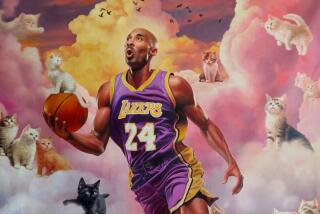Henri, afflicted by fame
SEATTLE — Henry is a difficult star, but filmmaker William Braden knows how to work with him.
If he needs Henry to run, Braden stands behind him and shouts to scare him into action. If he wants Henry to look annoyed, Braden blows in his face. If Henry won’t cooperate, Braden bribes him with catnip and Friskies Party Mix.
Over the last six years, Braden and Henry have developed a special relationship. Braden makes YouTube videos in which Henry plays a French existentialist named Henri. The two-minute videos of the fluffy black cat with particularly long whiskers are Internet sensations, viewed more than 10 million times.
“Henri 2: Paw de Deux,” the most popular of Braden’s cat videos, recently won the Golden Kitty, a people’s choice award at the Internet Cat Video Film Festival. The award, a statuette of a fat golden cat, sits on a shelf next to the filmmaker’s desk.
He has signed his first book deal. “Henri Le Chat Noir: The Existentialist Musings of an Angst-Filled Cat” will be published by an imprint of Random House next year.
He gets about $1,000 a week in revenue from his online store, selling Henri mouse pads, mugs and T-shirts to the existentialist cat’s devoted fans.
Braden, 32, used to work as a wedding videographer, but he is no longer accepting wedding gigs. He doesn’t need to.
“These past few months I’ve transferred to Henri full time,” Braden says. “I know how crazy it sounds to have this depressed French cat be my primary source of income.”
Even Thomas Edison found cats worth filming.
The first cat video was created in 1894, when Edison’s film studio produced a 20-second moving picture for his newly invented kinetoscope. “Prof. Welton’s Boxing Cats” featured two cats in a miniature boxing ring wearing boxing gloves. The Library of Congress uploaded the video to You Tube in 2009, and it has been seen more than 200,000 times.
No one can say for sure why cat videos attract such an enormous following, but Emily Huh, editor in chief of Cheezburger, a website of humor blogs, has a theory.
“Dog owners have a dog park where they can show off their dogs, but cat people don’t have that,” she says. “The Internet is where people who love cats can go to say, ‘Look how cute my cat is.’ ”
Henry made his Internet debut in 2006 when Braden was a student at the Seattle Film Institute. Braden was house-sitting for Henry’s owner in North Seattle when he got a class assignment to shoot a profile. He thought it’d be funnier to do an animal. Henry, who was easygoing and had a malleable face, came immediately to mind.
“He kind of looks stoned all the time, but that face is a blank slate,” Braden says.
Braden got the idea of parodying the European experimental films of the 1940s and ‘50s that he was watching in his film history class. His feline video “Henri” earned him an A and was a big hit with his fellow students.
It racked up 300,000 page views shortly after it went up on YouTube and is still being shown in class as an example of how a good film can be made with very little money. In fact, Braden says there is no cost to make the videos except for his time and what he already spent buying the camera and the editing software for his videography work.
Six years later, egged on by his friends and family, Braden decided to revisit the Henri character, with another short film, “Henri 2: Paw de Deux.”
The video features Henri in various states of repose as a piano gently plays in the background. A throaty French speaker (Braden, actually) gives voice to Henri’s ennui.
“I am free to go, yet I remain,” the English subtitle reads as Henri is shown gazing sullenly out the window. Later he catches himself in a bathroom mirror and observes, “We cannot escape ourselves.”
Henri is not the most popular cat on the Internet. That distinction belongs to Maru -- a kitty from Japan with an unusually large head and a deep affinity for cardboard boxes. A collection of Maru YouTube videos has been seen more than 163 million times, making him the most watched cat in the world. Maru even has his own agent.
Maru’s owner, who is notoriously publicity shy and is steadfast about remaining anonymous, says she started a blog to record his growth. In the beginning, each post was just a photograph and a sentence.
“However, I was not able to record Maru’s charm only with photographs,” she wrote in an email. She took videos of him, posted them to YouTube and embedded them on the blog, and watched in wonder as Maru’s YouTube channel became the seventh most popular in Japan.
Cat videos are so popular that they have spawned their own festival. This summer, the first ever Internet Cat Video Film Festival drew more than 10,000 people from all over the country. Some brought their cats; others wore kitty costumes.
Katie Hill, a cat lover working at the Walker Arts Center in Minneapolis, came up with the idea for the festival. She sorted through 10,000 cat video submissions before whittling the entries down to an hourlong collage.
When she asked people around the world to vote for their favorite, “Henri 2” won, and Braden was there to collect his fat golden cat.
Braden lives alone. He doesn’t have a cat, although he thinks about getting one. On his right arm is a tattoo of a black cat from a late 19th century poster advertising Le Chat Noir nightclub in Paris.
He and his muse live five minutes apart. He runs his growing Henri empire out of a 625-square-foot studio condo in Wallingford, where his view of the Space Needle has been obstructed by new construction.
The most luxurious item in the minimalist apartment is a Mac computer with an enormous screen. It was Braden’s first big splurge with what he calls “cat money.”
Every morning, he opens Facebook to concoct an existential reflection that goes out to 52,000 followers of Henri, also known to his fans as Le Chat Noir.
“Someone asked me if I love my caretakers,” he writes in Henri’s voice. “Love is a strange thing, and mostly indefinable. I sleep in their laundry basket, if that counts.”
Henry is an 8-year-old tuxedo cat with a regal white chest. He was adopted as a kitten from the Seattle Municipal Shelter. He lives with his owner and three other cats in a modest two-story house in North Seattle. His owner, a close relative of Braden, asks that she not be identified. She is worried that someone might kidnap Henry.
When the weather is nice, Henry spends most of his time outside, hiding under the trees and bushes around the house’s grassy frontyard. Henry’s owner describes the cat as a “gentle hunter.” He’ll often bring birds and small mammals back to the house, but they are almost always alive.
During one of Braden’s frequent visits, Henry’s owner carries the cat into the kitchen, where he makes himself comfortable on the table, purring as Braden strokes his back.
“He’s very relaxed, and I would say very happy,” the owner says. “He’s affectionate but he also keeps to himself. He purrs easily, but he doesn’t like to sit on laps.”
Her other three cats, including a snowy one named Ed White who shows up in the Henri films as “L’imbecile Blanc” or “the white imbecile,” run off and hide. Henry is the only one of the four who likes it when people come to the house.
“It’s kind of surreal to me that 50,000 people have friended my cat on Facebook,” Henry’s owner says, gazing at her cat with affection. “He knows he’s in a good place, but there’s no way to convey to him how many people know of him.”
Braden is working on another Henri video -- he won’t say exactly what, other than it is Halloween themed -- to premiere at the end of the month.
Filming usually takes place in the relative’s house. (Henry’s owner donates her cat’s time to Braden.) It is short but challenging. Henry tends to call it a day after about 20 minutes. Braden tries to bother the cat as little as possible, often shooting with a long lens, as a wild animal photographer would do. Occasionally he reverses a shot so it looks as if Henry is turning toward the camera when he is actually turning away.
“That is what $40,000 of film school will get you,” he says.
It takes Braden less than two weeks to make an Henri video. He films for three days, then spends about a week editing the footage and adding sound. He writes about half the video, about one minute of content, before he starts shooting. He wants to leave room for inspiration.
Braden knows that his life with Henri won’t last forever. At some point Henry will die, but even before that Braden fears he will run out of ideas.
“When I start shooting him against a green screen for a film about Henri in space, that’s when we’ll know it’s over,” he says.
For now, though, he tries to think about the future as little as possible. If the first Henri book sells well, he’d like to write a second one.
And if that sells well, he’d like to use some of his “cat money” to fund a different film project -- either a feature-length comedy set in Seattle or perhaps a Web series, starring people.
--
More to Read
The biggest entertainment stories
Get our big stories about Hollywood, film, television, music, arts, culture and more right in your inbox as soon as they publish.
You may occasionally receive promotional content from the Los Angeles Times.











